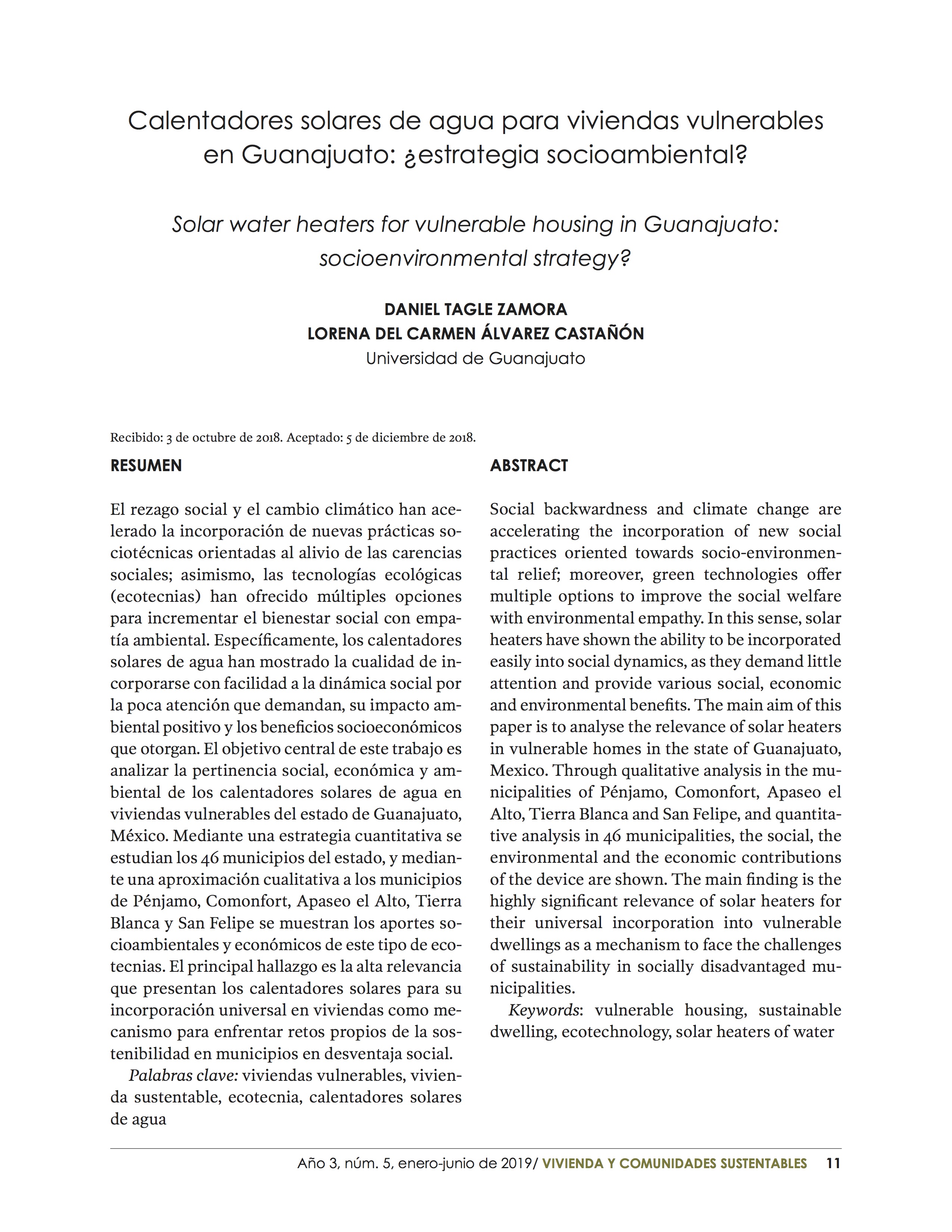Solar water heaters for vulnerable housing in Guanajuato
socio-environmental strategy?
DOI:
https://doi.org/10.32870/rvcs.v0i5.98Keywords:
vulnerable housing, sustainable dwelling, ecotechnology, solar heaters of waterAbstract
Social backwardness and climate change are accelerating the incorporation of new social practices oriented towards socio-environmental relief; moreover, green technologies offer multiple options to improve social welfare with environmental empathy. In this sense, solar heaters have shown the ability to be incorporated easily into social dynamics, as they demand little attention and provide various social, economic, and environmental bene ts. The main aim of this paper is to analyse the relevance of solar heaters in vulnerable homes in the state of Guanajuato, Mexico. Through qualitative analysis in the municipalities of Penjamo, Comonfort, Apaseo el Alto, Tierra Blanca, and San Felipe, and quantitative analysis in 46 municipalities, the social, environmental, and economic contributions of the device are shown. The main finding is the highly significant relevance of solar heaters for their universal incorporation into vulnerable dwellings as a mechanism to face the challenges of sustainability in socially disadvantaged municipalities.References
Acosta, J. R. y G. Aguilar (2018), "El programa hipoteca verde del INFONAVIT: ¿Hacia una política de vivienda sustentable?", Vivienda y Comunida- des Sustentables, año 2, núm. 3, pp. 25-34.
https://doi.org/10.32870/rvcs.v0i3.36
Álvarez L. y D. Tagle (2019), "Transferencia de ecotecnologías y su adopción social en localidades vulnerables: una metodología para valorar su viabilidad", Ciencia UAT, 13 (2), pp. 83-99.
https://doi.org/10.29059/cienciauat.v13i2.1121
Álvarez, L.; Tagle, D. y M. Romero (2018), "Transference of Ecotechnology in Disadvantaged Regions of Mexico, towards Sustainable Development", en Leal-Filho et al. (ed.), Sustainable Development Research and Practice in Mexico and Selected Latin American Countries. World Sustainability Series, Springer, Cham., pp. 139-152. https://doi.org/10.1007/978-3-319-70560-6_9
Secretaría de Gobernación (2018), Norma Oficial Mexicana, NOM-027-ener/SCFI-2018, "Rendimiento térmico, ahorro de gas y requisitos de seguridad de los calentadores de agua solares y de los calentadores de agua solares con respaldo de un calentador de agua que utiliza como combustible gas lp o gas natural. Especificaciones, métodos de prueba y etiquetado", Diario Oficial de la Federación. Disponible en: https://www.dof.gob.mx/nota_detalle. php?codigo=5536063&fecha=28/08/2018.
IMTA (2012), Transferencia de ecotecnias (tecnologías apropiadas). Disponible en: https://agua.org. mx/wp-content/uploads/2017/07/Transferencia-Ecotecnias_MERB_imta.pdf.
INEGI(2010), Sistema para la consulta de las Síntesis Estadísticas Municipales 2010. Disponible en: http://sc.inegi.org.mx/cobdem/resultados.js- p?w=51&Backidhecho=509&Backconstem=508&- constembd=177&tm=%27Backidhecho:3,Back- constem:3,constembd:3%27.
--- (2015), México en cifras. Hogares, vivienda y urbanización. Disponible en: http://www.beta. inegi.org.mx/app/areasgeogra cas/?ag=11#.
INFONAVIT (2016), Manual explicativo de la vivienda ecológica: Hipoteca Verde, México, INFONAVIT.
Leff , E. (2002), Saber ambiental: Sustentabilidad, racionalidad, complejidad, poder, Siglo XXI.
Luna A.; González A. y M. Ramírez (2012), "Grupos de ganaderos para la validación y transferencia de tecnología: una contribución para reducir el deterioro ambiental en Guanajuato", en La biodiversidad en Guanajuato: Estudio de estado vol. I, México, Comisión Nacional para el Conocimiento y Uso de la Biodiversidad (CONABIO) e Instituto de Ecología del Estado de Guanajuato (IEE), pp. 221-227.
Martínez, J. L. (2013), Metodología de evaluación de tecnologías apropiadas, IMTA-SEMARNAT. Disponible en: http://repositorio.imta.mx/handle/20.500.12013/787.
Ortiz, J.; O. Maseray A. Fuentes (2014), La ecotecnología en México. Morelia: Unidad de Ecotecnologías, IMAGIA, CIECO, UNAM.
Pineda, R.; Pérez, M. y L. González (2018), "Ecotecnologías, manejo de cuencas, desarrollo humano y cambio climático", en D. Tagle y J. Herrera (coord.), Análisis multidimensional en la implementación de ecotecnias: reflexiones teórico-prácticas, México, Fontamara, pp. 119-139.
Romero, N. (2012), Manual básico de ecotecnias. Un acercamiento a las ecotecnias y buenos hábitos, México, Centro de las Artes Indígenas.
Secretaría de Desarrollo Social y Humano (2015), Términos de referencia: Transformación sociocultural. Uso y aplicación de ecotecnias para el mejoramiento de la vivienda en San Felipe, Pénjamo, Apaseo el Alto, Tierra Blanca y Comonfort del estado de Guanajuato 2015.
Secretaría de Medioambiente y Recursos Naturales (2017), Nota conceptual del proyecto de calentadores solares de agua, México, SEMARNAT.
Tagle, D.; Ramírez, R. y R. Caldera (2017), "Retos sociales y ambientales en la implementación de ecotecnias en Guanajuato, México", Revista Administración y Organizaciones, México, UNAM-X, pp. 163-184.

Downloads
Published
How to Cite
Issue
Section
License
Copyright (c) 2019 Vivienda y Comunidades Sustentables

This work is licensed under a Creative Commons Attribution-NonCommercial-NoDerivatives 4.0 International License.
The authors who publish in this journal accept the following conditions:
In accordance with the copyright legislation, Sustainable Housing and Communities recognizes and respects the moral right of the authors, as well as the ownership of the patrimonial right, which will be transferred to the University of Guadalajara for its dissemination in open access. Sustainable Housing and Communities does not charge authors for submitting and processing articles for publication. Authors may make other independent and additional contractual agreements for the non-exclusive distribution of the version of the article published in Sustainable Housing and Communities (for example, include it in an institutional repository or publish it in a book) as long as they clearly indicate that the work is published for the first time in Sustainable Housing and Communities.





